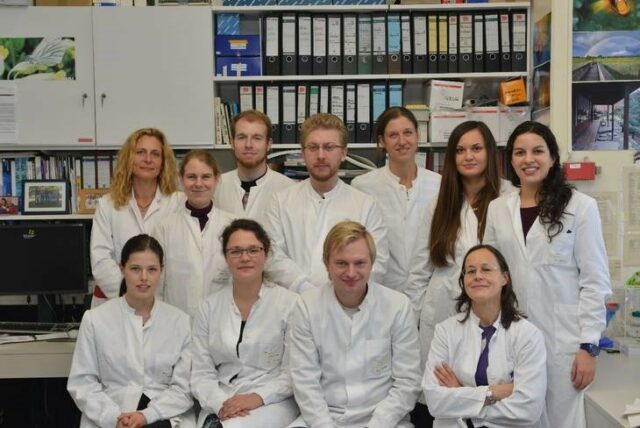Research Group Prof. Dr. Christine Josenhans
The group led by Prof. C. Josenhans joined the Max von Pettenkofer Institute in the fall 2017.
The gastrointestinal tract of humans and most vertebrate organisms is at the same time the largest body surface, colonization niche of a variety of different microbes, as well as the most important barrier and entry point of gastrointestinal and some systemic pathogens. Gastrointestinal pathogens, in particular bacteria, are adapted in a specific manner to the mucosal niche of the gut and stomach lining. They assemble complex secretion systems, which help them to be motile within the mucus, and establish contact and interactions with the host and local host cells. Likewise, they possess metabolic and other factors, which enable them to compete with the resident microbiota of the gut and surmount colonization resistance. In addition, they are able, with the help of specific factors and functions, to influence the composition of the resident microbiota and the inflammatory response of the local tissues, in order to govern their own temporal and spatial persistence within the niche.
Major scientific interest in the Josenhans lab is on the host innate immune response towards gastrointestinal pathogens and its modulation. In this context, the modulatory activity of bacterial complex secretion systems (type 3, type 4, type 6) on the host cell is investigated, including the biochemical and structural characterization of its protein components. The lab also addresses questions concerned with gene and protein regulation and modification in host and pathogen, also during the infectious process. A second focus is placed on host modulation by pathogens and the modulation of inflammatory diseases, also with respect to environmental factors, including the resident gastrointestinal microbiota. Main model systems to study chronic and acute gastrointestinal bacterial pathogens are the human pathogens Helicobacter pylori and Campylobacter jejuni as well as the chronic mouse gut pathogen Helicobacter hepaticus, which can serve as a model for chronic inflammatory diseases. We also place a major emphasis on the factors that activate and modulate the host innate immune system (human but also others), and, on the host side, the receptors and signal transduction pathways that are invoved in the host innate immune response.


